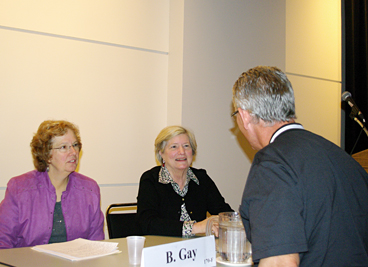
The observation stay loophole and sequestration cuts are among the top political issues that should concern providers this fall, a policy expert said Wednesday.
Congress faces a few ways to tackle the cuts, which are projected to reduce skilled nursing payments by $9 billion over 10 years. While the cuts are scheduled to hit in January, experts such as Barbara Gay, the LeadingAge Director of Advocacy Information, believe it’s likely the cuts will be delayed.
Regardless, “no matter who wins, Democrat or Republican, there will be efforts to pare back Medicare and Medicaid spending,” she said during a session at LeadingAge’s annual meeting.
“The No. 1 thing is there is a lot that’s still up in the air. We want people to be in touch with their legislators during the lame duck session,” Gay said. “The observation stay loophole has to be fixed.”
The issue is one in which long-term care providers and aging consumer groups agree, a rare occurrence, she noted.
The loophole is “really a consumer issue because it’s the consumer that can be stuck for several thousand dollars. It really needs to be fixed.”
On the government side, Karalou Mattern, Survey Branch Manager, Denver Regional Office of the Centers for Medicare & Medicaid Services, spoke on recent changes to the Nursing Home Compare website and CMS’ National Partnership to Improve Dementia Care.
Possible future changes to Nursing Home Compare may include additional consumer testing, payroll staffing data, satisfaction surveys and information on facilities such as whether there are private rooms, she said. As the agency pushes for a reduction in antipsychotic off-label use, it is conducting a case study of 175 residents in more than 20 nursing homes on how facilities make decisions to use the drugs.
CMS is also promoting its training program, called Hand-in-Hand, to help direct care workers focused on person-centered care and prevention of abuse, Mattern said.




